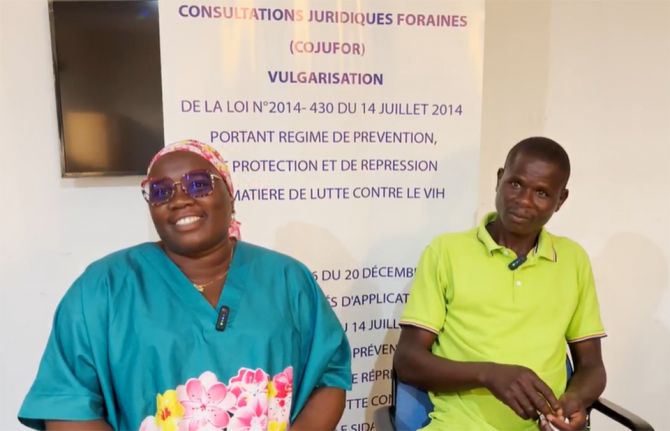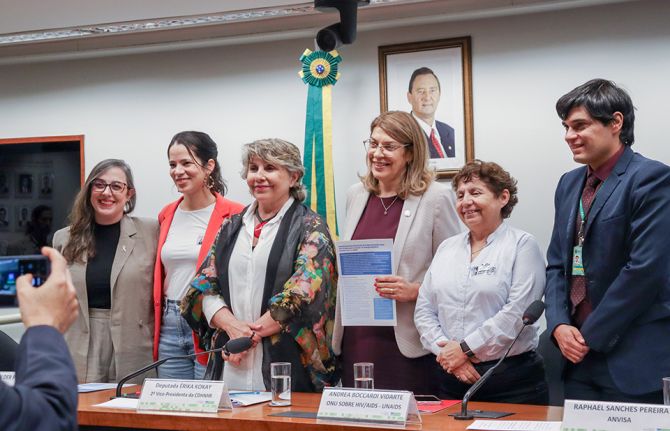
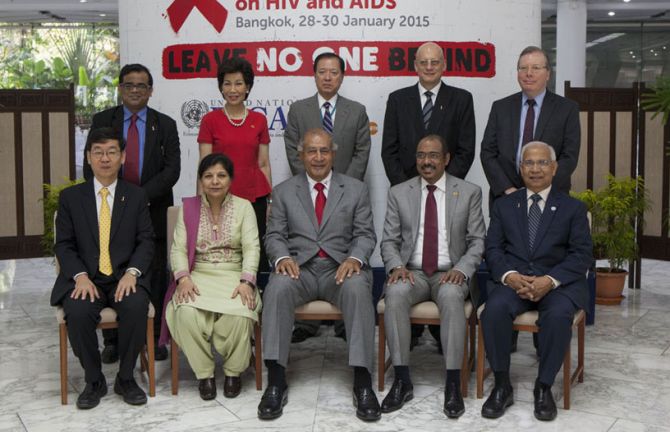
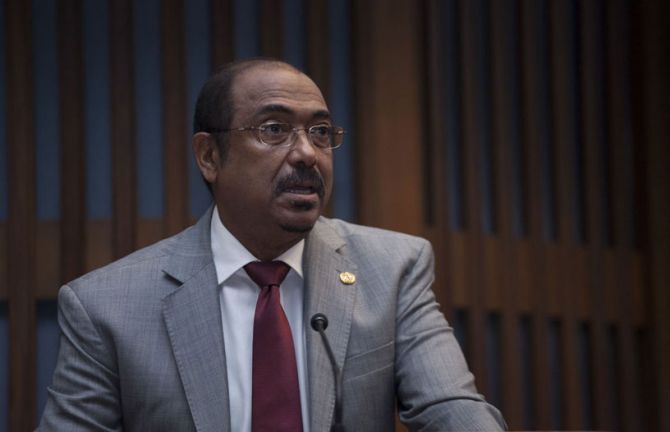
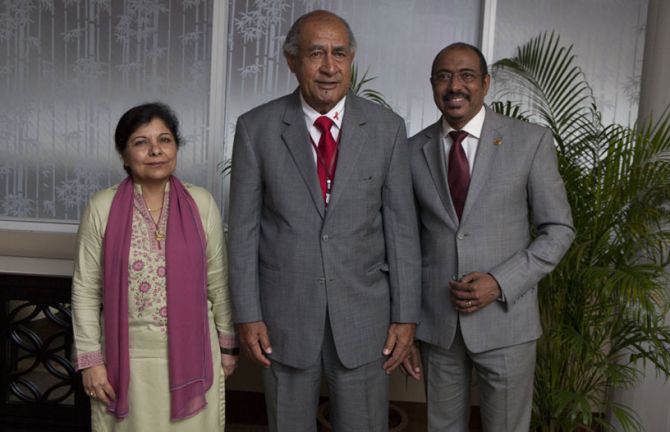
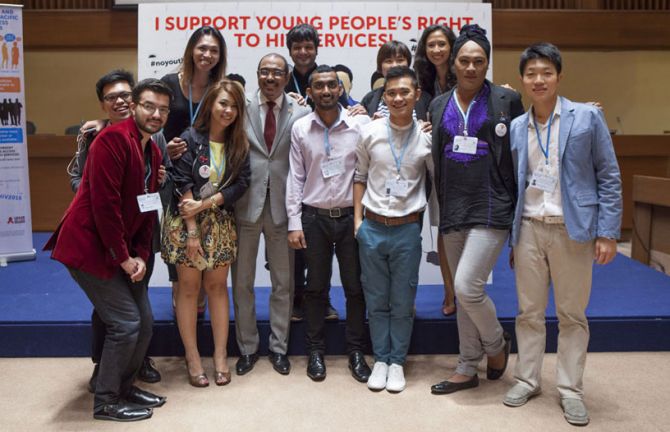
Update
Defining the response to the AIDS epidemic in the Asia–Pacific region
28 January 2015
28 January 2015 28 January 2015The Asia–Pacific Intergovernmental Meeting on HIV and AIDS has opened in Bangkok, Thailand. More than 250 representatives of governments, civil society and international organizations from across the region are assessing progress on the response to the AIDS epidemic and considering challenges for the future.
The Asia–Pacific region has achieved significant results in the HIV response over the past decade. In 2013, there were an estimated 350 000 new HIV infections in the region, a decline of 25% since 2001. Between 2005 and 2013, the number of AIDS-related deaths in the region fell by 27%.
Around 1.56 million people living with HIV in the Asia–Pacific region had access to antiretroviral therapy in 2013, a 25% increase over the previous year. However, this still accounts for only one in three people living with HIV, and many people start treatment late.
One of the most pressing challenges for the region is how to ensure that the AIDS response remains financially sustainable. In 2013, more than US$ 2 billion was mobilized for the region’s response to AIDS, with 43% of the funding supplied by international donors. The participants of the meeting are reviewing the financing of national AIDS programmes, with the aim of increasing national investment.
Participants are also discussing the new 90–90–90 global treatment targets, with civil society representatives calling for more community-based HIV services. Although the epidemic in the region is concentrated among key populations, less than 8% of overall AIDS spending is dedicated to HIV prevention among such populations.
Convened by the Economic and Social Commission for Asia and the Pacific in cooperation with UNAIDS, the United Nations Development Programme and other organizations, the meeting runs until 30 January and is expected to see the adoption of a new regional framework to respond to the epidemic.
Quotes
“Countries in the Asia–Pacific region have taken responsibility for financing the AIDS response. I am pleased that my own country has taken this important step towards ensuring the financial sustainability of the AIDS response.”
“We know this region is not just a hub of economic transformation but of innovation and with collective energy we can really help to build a new partnership with the rest of the world.”
“Real progress has been made across our region, but scope remains for greater leadership and ownership to achieve our goals. An effective HIV response is possible only with seamless partnerships across countries.”
“Human rights violations, discrimination and punitive laws like the criminalization of drug users, sex workers, same-sex practices and transgender people, have been the greatest barrier to key affected populations accessing services.”
Multimedia
Region/country

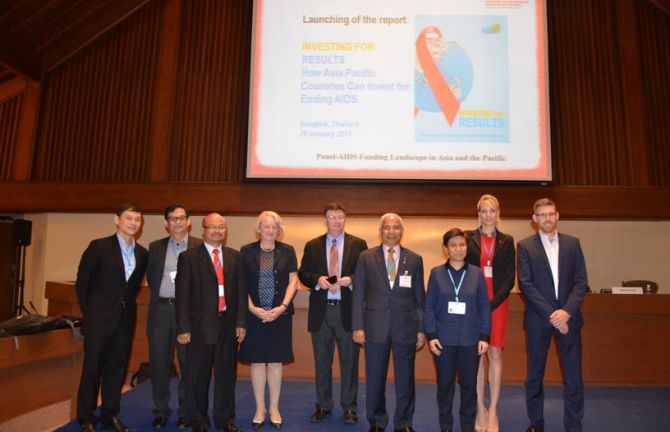
Update
Funding the future AIDS response in the Asia–Pacific region
30 January 2015
30 January 2015 30 January 2015A report on the AIDS funding landscape in the Asia–Pacific region, Investing for results: how Asia–Pacific countries can invest for ending AIDS, has been launched at a side event at the Asia–Pacific Intergovernmental Meeting on HIV and AIDS, which took place in Bangkok, Thailand, from 28 to 30 January. The report summarizes an analysis carried out by an independent advisory panel.
Convened jointly by UNAIDS and the World Bank and chaired by the United Nations Secretary-General’s Special Envoy for AIDS in Asia and the Pacific, J.V.R. Prasada Rao, the 11-member panel was comprised of public health experts, policy leaders and representatives of civil society organizations.
With many countries in the region graduating to middle-income status, external funding is shrinking and the panel was tasked with resolving the funding gap.
It analysed the existing policy and funding commitments for the national AIDS response in the region and suggested a set of nine concrete recommendations to help guide and sustain the AIDS response in the coming years.
The recommendations included introducing funding transition plans to enable countries to take advantage of continued donor assistance while shifting to greater domestic investment, focusing resources where most new HIV infections occur and protecting funding for civil society.
Quotes
“Without assured and scaled up funding over the next decade, there is a real danger of past gains being wiped out, leading to a resurgence of the epidemic.”
“Asia and the Pacific could become the first region to end AIDS as a public health threat by 2030, if countries make the right strategic choices.”
“In this region, we need to change our definition of success. We cannot use any longer a process definition of success. Our definition has to be about reducing HIV incidence and driving it as close to zero as possible.”
Region/country

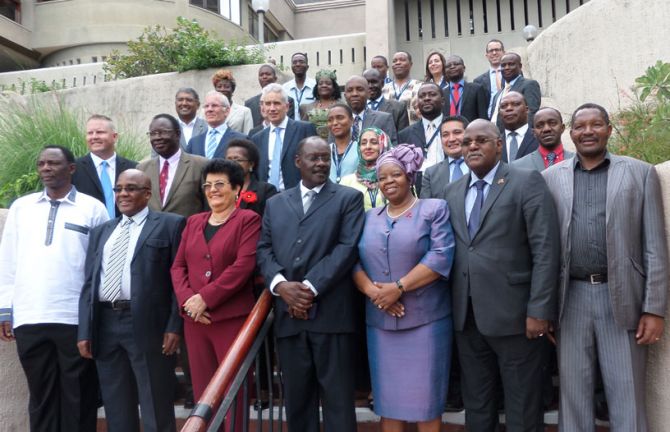
Update
Sustaining the AIDS response through public–private partnerships
20 January 2015
20 January 2015 20 January 2015The ministers of health and private sector representatives of the countries of the Southern Africa Development Community (SADC) agreed on 15 January to establish a health trust fund to sustain the response to AIDS, tuberculosis and malaria.
Participants at the first-ever formal dialogue between SADC health ministers and the private sector, which was held in Victoria Falls, Zimbabwe, on the sidelines of the Joint Meeting of the SADC Ministers of Health and Ministers Responsible for HIV and AIDS, agreed on a public–private health financing partnership anchored on the following four priorities:
- Establish a regional health trust fund before the World Health Assembly in May 2015.
- Create a public–private working group to meet twice a year on the sidelines of the SADC ministers of health meetings to review and strengthen joint initiatives.
- Develop an information exchange portal to improve knowledge and experience-sharing between the public and private sectors.
- Strengthen employee health programmes in the private sector and introduce health reporting—known as the fourth bottom line strategy—in corporate financial reporting.
Participants appointed Sheila Tlou, Director of the UNAIDS Regional Support Team for Eastern and Southern Africa, to lead the establishment of a task team with a mandate that includes creating the public–private trust fund and proposing innovative funding mechanisms.
Quotes
“Increased domestic funding is crucial and each country must appeal to ministers of finance and Heads of State to strengthen this innovative resource mechanism. This important partnership with the private sector will also assist us with the efficiency of existing resources allocated to disease-specific interventions.”
“This is a historic event that underlines the importance of partnerships between government and the private sector. No government on its own can overcome the challenges of AIDS, tuberculosis and malaria.”
“Healthy workforces and healthy communities are essential for business success and economic growth. The private sector should not leave the responsibility of strengthening health systems to government alone. We can do much more to build health systems based on the best of what both the public and private sectors have to offer.”
Related

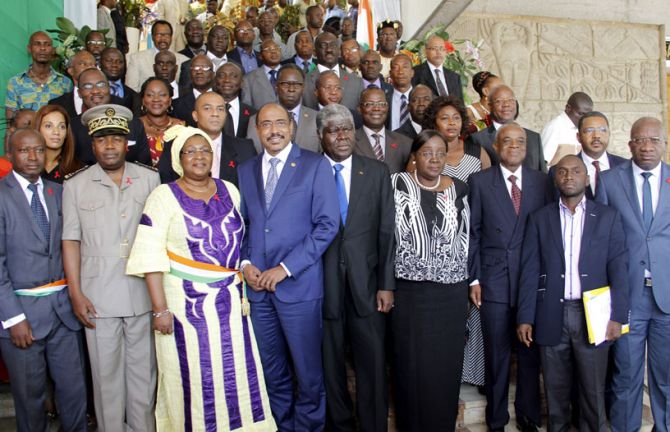
Update
Mayors in Côte d’Ivoire commit to ending AIDS as a public health threat by 2030
22 December 2014
22 December 2014 22 December 2014Mayors from major cities and urban areas in Côte d’Ivoire have come together to sign the Paris Declaration, pledging their support to accelerate the response to HIV over the next five years.
Thirteen mayors from the Abidjan district and around 20 from other major cities across the country joined UNAIDS Executive Director Michel Sidibé and the Governor of Abidjan, Beugré Mambé, to sign the Paris Declaration, putting their cities on the Fast-Track to ending the AIDS epidemic by 2030.
The Paris Declaration includes commitments to reach ambitious 90–90–90 targets by 2020, which will mean 90% of people living with HIV knowing their HIV status, 90% of people who know their HIV-positive status on antiretroviral therapy and 90% of people on treatment with suppressed viral loads.
It is estimated that around 40% of people living with HIV in Côte d’Ivoire live in Abidjan, which has an HIV prevalence of 3.6%, compared with 2.7% nationally.
The Paris Declaration was signed in Paris on World Aids Day 2014 by the Mayor of Paris, Anne Hidalgo, and more than 20 of her counterparts from cities around the world. Other mayors are now being invited to join the initiative.
Quotes
“The Ministry of Health fully supports UNAIDS’ Fast-Track Cities initiative aimed at engaging mayors and other city officials to step up their AIDS response and garnering support from multiple stakeholders, including affected communities, key populations, and technical and financial partners.”
“Our town has taken the lead for a long time thanks to a health facility offering counselling, testing and care services for people living with HIV. We fully endorse UNAIDS’ initiative and we plan to triple our AIDS budget from 10 million CFA francs to achieve the 90-90-90 goal by 2020.”
“We already know that the pace of urbanization is unstoppable. Indeed, in 2030 at least 6 out of 10 people will live in cities. Cities will become the most important magnets. Cities will definitely enable the democratic change we always have longed for. This will contribute to human security, which is essential for social stability.”
Region/country


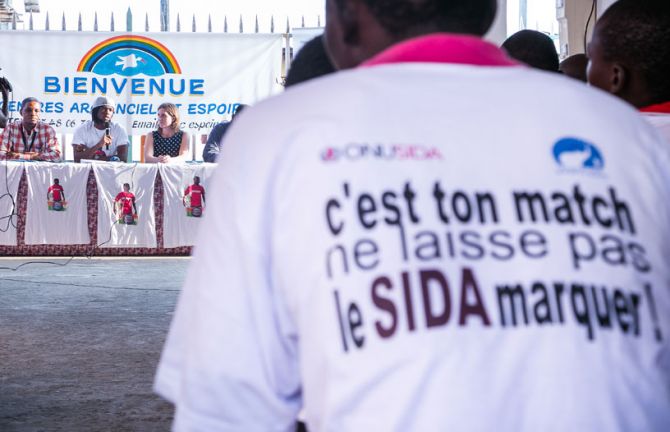

Update
Ivorian star footballer on a mission to protect the goal with UNAIDS in Gabon
23 December 2014
23 December 2014 23 December 2014Ivorian football player Gervinho, a UNAIDS Ambassador for the Protect the Goal campaign, took the opportunity during a private stay in Gabon to learn about the AIDS epidemic in the country.
UNAIDS Officer in Charge Rodrigue Nze Eyo’o briefed Gervinho on the national epidemic, challenges and successes and the work and role of UNAIDS in the country. Awareness, prevention and testing campaigns are key to reaching youth and the most vulnerable populations. Gervinho’s generous contributions and engagement play a crucial role in reaching a large audience with important HIV prevention messages.
During his fact-finding mission, Gervinho also showed his ball skills on the pitch during an HIV awareness-raising football game organized by the nongovernmental organization Rainbow with the support of the UNAIDS Country Office in Gabon. At the game, Gervinho had the opportunity to speak to young vulnerable people, orphans, out-of-school children and young people living with HIV about the challenges they face in their daily lives.
Quotes
“I am so impressed with their energy and courage. Young people have so much to give and it upsets me that many of them have to face stigma and discrimination just because they live with HIV. This is why I decided to support the Protect the Goal Campaign. The youth is our future and we must speak up and fight the stigma and discrimination associated with HIV.”
Campaigns
Region/country
Related


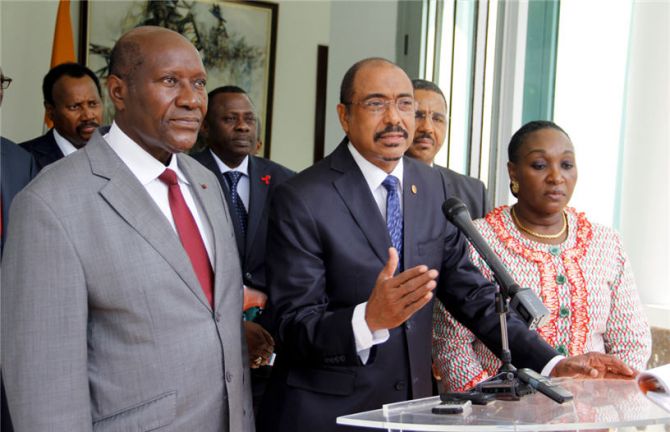
Update
Côte d’Ivoire continues to accelerate its AIDS response
19 December 2014
19 December 2014 19 December 2014During its annual meeting in Abidjan, which was attended by UNAIDS Executive Director Michel Sidibé, members of Côte d’Ivoire’s national AIDS council reiterated their pledge to Fast-Track their response to end the country’s AIDS epidemic.
President Alassane Ouattara, who leads the national AIDS council, told delegates that no one should be left behind and pointed to recent legislation passed by parliament to end stigma and discrimination against people affected by HIV.
During the meeting, President Ouattara also welcomed innovative funding streams originating from taxes on tobacco products and air travel, which have contributed to a national solidarity fund aimed at accelerating the response to the epidemic.
It is estimated that 370 000 people in Côte d’Ivoire are living with HIV, with just one in three currently accessing antiretroviral treatment.
Quotes
“We are determined to pursue our efforts in the HIV response and to protect our country against Ebola. I am convinced that improving health indicators are a sign of sustainable development in Côte d’Ivoire.”
“Sustainable development depends on the education and good health of the country’s men and women.”
“Côte d’Ivoire has bent the trajectory of the AIDS epidemic and it is crucial that no one is left behind. An AIDS-free generation could be the best political legacy in an emerging Côte d’Ivoire.”
Region/country


Update
Commonwealth of Independent States endorses declaration in order to consolidate efforts in the HIV response
12 December 2014
12 December 2014 12 December 2014Member states of the Commonwealth of Independent States (CIS) unanimously adopted the Declaration of Commitment on HIV/AIDS at the CIS’s recent Health Council meeting in Minsk, Belarus. The declaration will serve as the foundation to fast-track programmes and activities in response to the AIDS epidemic in the CIS region.
According to UNAIDS estimates, 1.1 million people were living with HIV in eastern Europe and central Asia in 2013, mostly in the CIS region. While in other parts of the world the number of new HIV infections and AIDS-related deaths is declining, they are increasing in the CIS.
CIS member states have agreed to work together and with civil society in order to ensure access to HIV prevention, treatment, care and support services. They will also intensify their efforts to reach key populations at higher risk of HIV infection.
Quotes
"I am very pleased this important declaration on the CIS commitment to AIDS is being unanimously adopted under the chairmanship of Belarus. I am confident that together we will work to scale up life-saving services for HIV prevention and treatment and ensure zero discrimination.”
"The CIS countries have all the elements to fast-track their HIV responses to end the AIDS epidemic. This declaration is a milestone to close the gap across the CIS and for a close partnership between government, civil society and international organizations such as the CIS and UNAIDS.”
Region/country
Related

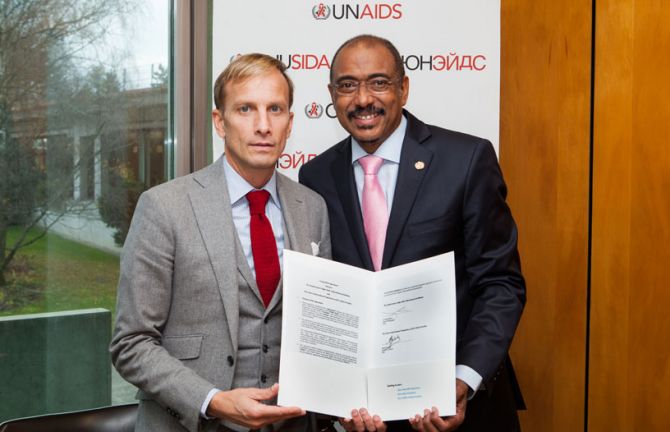
Update
UNAIDS and the Global Fund strengthen collaboration to fast-track the response to AIDS
09 December 2014
09 December 2014 09 December 2014UNAIDS and the Global Fund to Fight AIDS, Tuberculosis and Malaria highlighted their strong partnership to respond to infectious diseases, including HIV and tuberculosis, with a new cooperation agreement to help countries achieve the Fast-Track Targets to end the AIDS epidemic as a global health threat by 2030.
At the core of the agreement is an improved way of collaborating that strengthens coordination mechanisms, information-sharing at all levels and mutual accountability.
The UNAIDS Fast-Track approach emphasizes the need to focus on the counties, cities and communities most affected by HIV and recommends that resources be concentrated on the areas with the greatest impact. The new agreement will focus on maximizing support to countries and optimizing investments and impact at the country level.
Cooperation areas include strengthening strategic investments, jointly leveraging political commitment and supporting meaningful country dialogues with all stakeholders—including civil society and communities—to ensure that no one is left behind.
The new agreement will leverage the strengths of both organizations in providing technical support to countries and coordination throughout the grant cycle. Special emphasis will be placed on data collection, analysis and identification of gaps in the epidemic and the response, including on countries’ enabling environments, equity in access to services, human rights, gender and key populations at higher risk.
The new cooperation agreement replaces a memorandum of understanding signed in 2008. The agreement will be revisited at the end of 2016.
Quotes
“This agreement with the Global Fund reinforces our strong relationship and will advance our joint efforts to end the AIDS epidemic by 2030. UNAIDS is fully mobilized to support the Global Fund’s New Funding Model, which will empower countries to be even more effective, inclusive, grounded in human rights and sustainable in their AIDS responses.”
“Working together, we can achieve even more for people affected by HIV. This agreement captures the spirit of collaboration, which we already do, and will help take us to an even greater level.”

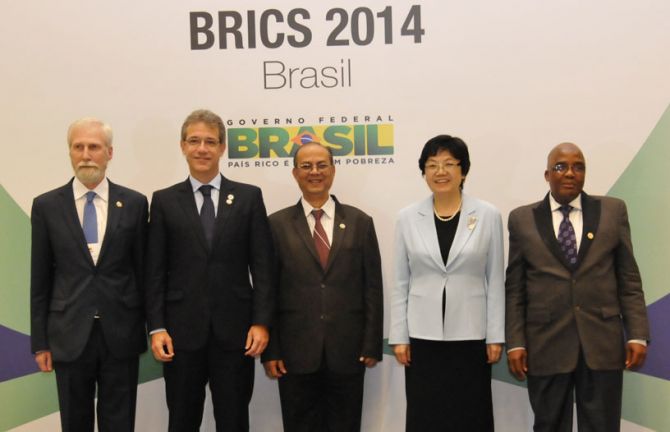
Update
BRICS health ministers adopt the UNAIDS Fast-Track strategy to end the AIDS epidemic
10 December 2014
10 December 2014 10 December 2014Health ministers from Brazil, Russian Federation, India, China and South Africa (BRICS) have committed to adopting the UNAIDS Fast-Track strategy to end the AIDS epidemic as a global health threat by 2030.
The decision was announced at a meeting of the ministers of health of the BRICS countries, held in Brasilia, Brazil, from 4 to 5 December. The ministers agreed to endeavour to achieve the 90–90–90 HIV treatment target by 2020, which is to rapidly reduce new HIV infections and AIDS-related deaths and to put countries on the Fast-Track to ending the AIDS epidemic by 2030. They also committed to ambitious tuberculosis (TB) targets and to advance cooperation and action on TB and HIV in the BRICS countries, such as the production of quality assured drugs and diagnostics for TB cases.
In 2013, the BRICS countries accounted for about 30% of new HIV infections worldwide. Estimates are that nearly half of all TB cases, 55% of multidrug resistant TB cases and 38% of all TB/HIV cases occur in the BRICS countries.
The adoption of the Fast-Track strategy by the health ministers demonstrates the renewed political commitment of the BRICS countries to work together to lessen the impact of TB/HIV coinfection. According to UNAIDS, the majority of people living with HIV will live in middle-income countries in the near future. In this regard, the BRICS countries can serve as a reference to provide solutions and exchange experiences with emerging economies.
UNAIDS Deputy Executive Director Luiz Loures called for an increased leadership by the BRICS countries to motivate the global community to implement the 90–90–90 treatment target and also fast-track the response to AIDS.
Quotes
"The possibility of ensuring free first-line treatment against tuberculosis is a milestone and it demonstrates our engagement, our incentive to the development of technologies and our support to multilateral health initiatives."
"We are happy to see that the BRICS countries are deepening discussions and moving towards collaborating actions for addressing the tuberculosis and HIV burden in the BRICS countries and beyond."

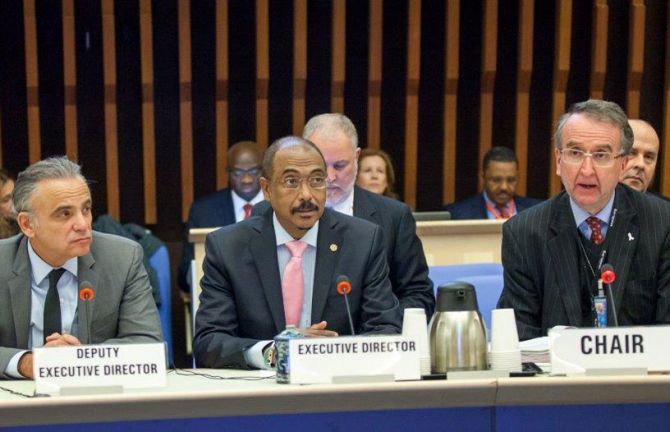
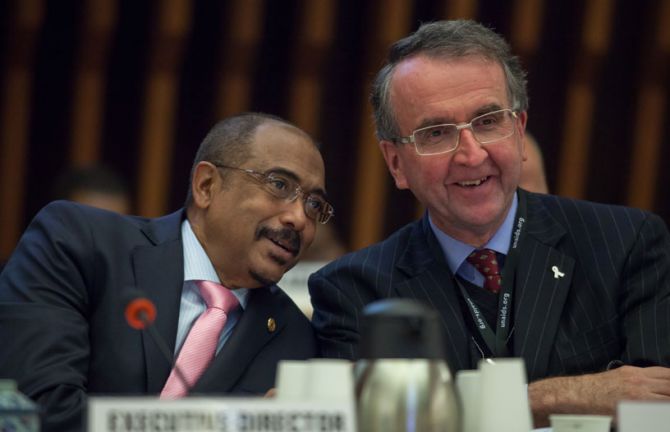
Update
35th meeting of the UNAIDS Programme Coordinating Board opens
09 December 2014
09 December 2014 09 December 2014The 35th meeting of the UNAIDS Programme Coordinating Board is taking place in Geneva, Switzerland, from 9 to 11 December.
During the opening session, UNAIDS Executive Director Michel Sidibé addressed the Board giving an update of the progress made in the AIDS response as well as outlining the challenges ahead in achieving the Joint Programme’s Fast-Track 90-90-90 treatment targets by 2020.
Mr Sidibé said the response to HIV over the next five years would determine what happened over the next 15 years. “We face a historic opportunity to turn our dream of the end of the AIDS epidemic into reality if we act now,” he said.
The thematic segment of the meeting will take place on Thursday and will focus on people who inject drugs. Participants will examine policy and programmatic actions to halve HIV transmission among people who inject drugs.
The 35th meeting of the UNAIDS Board is being chaired by Australia, with Zimbabwe acting as Vice-Chair and El Salvador as rapporteur.












